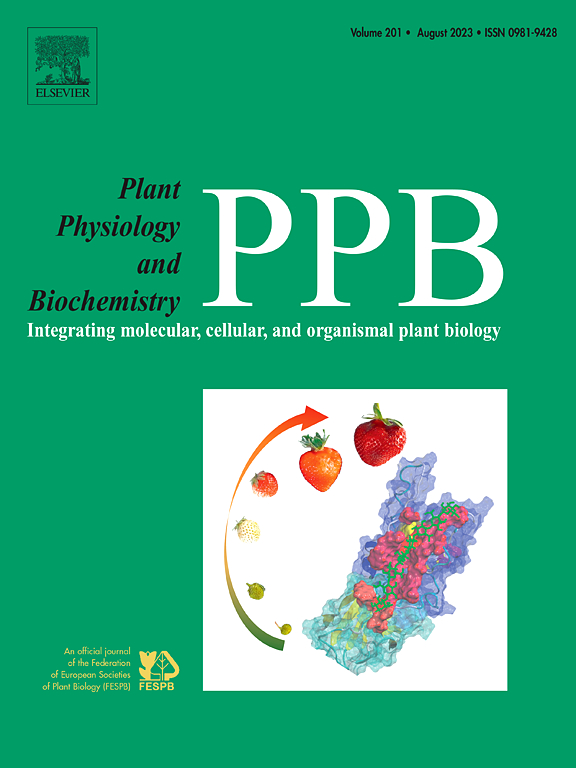苜蓿黄酮醇合成酶基因的全基因组分析及MsFLS13对冷胁迫的功能鉴定
IF 6.1
2区 生物学
Q1 PLANT SCIENCES
引用次数: 0
摘要
黄酮醇合成酶(FLS)在植物黄酮醇生物合成中起着至关重要的作用,对植物的生长发育和抗非生物胁迫能力起着至关重要的作用。然而,对FLS基因家族的全面分析及其在苜蓿(Medicago sativa L.)冷胁迫下的作用仍未得到充分的研究。因此,本研究旨在采用生物信息学方法,整合各种数据库和计算工具,系统研究苜蓿(Medicago sativa L)全基因组的MsFLSs基因家族。此外,通过qRT-PCR实验验证表达模式。根据系统发育树,共鉴定出20个MsFLS基因,并将其划分为5个不同的亚群。基因结构分析表明,紫花苜蓿基因含有1 ~ 5个内含子。同一进化分支内成员的内含子数量大体一致。MsFLS启动子区域包含大量激素响应性、应激响应性、光响应性和组织特异性调控元件。此外,大约95%(19/20)的苜蓿FLS基因在47个复制事件中发生了串联和片段复制。冷胁迫触发了MsFLS基因家族的表达,其中MsFLS7、MsFLS9、MsFLS10、MsFLS11、MsFLS13、MsFLS16、MsFLS17和MsFLS18表达显著上调。过表达MsFLS13可显著提高紫花苜蓿的冷胁迫耐受性和抗氧化能力,减轻膜氧化损伤。这些发现为进一步研究MsFLS基因在紫花苜蓿冷胁迫响应中的功能作用提供了有价值的见解。本文章由计算机程序翻译,如有差异,请以英文原文为准。
Genome-wide analysis of alfalfa flavonol synthase genes and functional identification of MsFLS13 in response to cold stress
Flavonol synthase (FLS) plays a vital role in flavonol biosynthesis in plants, crucial in their growth, development, and ability to withstand abiotic stress. However, a comprehensive analysis of the FLS gene family and its role in alfalfa (Medicago sativa L.) under cold stress remains unexplored. Therefore, this study aims to employ bioinformatics methods, integrating various databases and computational tools, to systematically investigate the MsFLSs gene family across the entire alfalfa (Medicago sativa L) genome. Furthermore, qRT-PCR experiments were performed to validate expression patterns. Twenty MsFLS genes were identified and classified into five distinct subgroups based on their phylogenetic trees. Gene structure analysis revealed that alfalfa genes contained between one and five introns. The number of introns within members of the same evolutionary branch was generally consistent. The MsFLS promoter region contained a substantial number of hormone-responsive, stress-responsive, light-responsive, and tissue-specific regulatory elements. Additionally, approximately 95 % (19/20) of the alfalfa FLS genes underwent duplication events involving tandem and fragment replications across 47 replication events. Cold stress triggered the expression of the MsFLS gene family, with MsFLS7, MsFLS9, MsFLS10, MsFLS11, MsFLS13, MsFLS16, MsFLS17 and MsFLS18 showing significant upregulation. The overexpression of MsFLS13 significantly improved cold stress tolerance and antioxidant capacity and reduced membrane oxidative damage in alfalfa. These findings offer valuable insights for future research on the functional role of MsFLS genes in response to cold stress in alfalfa.
求助全文
通过发布文献求助,成功后即可免费获取论文全文。
去求助
来源期刊
CiteScore
11.10
自引率
3.10%
发文量
410
审稿时长
33 days
期刊介绍:
Plant Physiology and Biochemistry publishes original theoretical, experimental and technical contributions in the various fields of plant physiology (biochemistry, physiology, structure, genetics, plant-microbe interactions, etc.) at diverse levels of integration (molecular, subcellular, cellular, organ, whole plant, environmental). Opinions expressed in the journal are the sole responsibility of the authors and publication does not imply the editors'' agreement.
Manuscripts describing molecular-genetic and/or gene expression data that are not integrated with biochemical analysis and/or actual measurements of plant physiological processes are not suitable for PPB. Also "Omics" studies (transcriptomics, proteomics, metabolomics, etc.) reporting descriptive analysis without an element of functional validation assays, will not be considered. Similarly, applied agronomic or phytochemical studies that generate no new, fundamental insights in plant physiological and/or biochemical processes are not suitable for publication in PPB.
Plant Physiology and Biochemistry publishes several types of articles: Reviews, Papers and Short Papers. Articles for Reviews are either invited by the editor or proposed by the authors for the editor''s prior agreement. Reviews should not exceed 40 typewritten pages and Short Papers no more than approximately 8 typewritten pages. The fundamental character of Plant Physiology and Biochemistry remains that of a journal for original results.

 求助内容:
求助内容: 应助结果提醒方式:
应助结果提醒方式:


